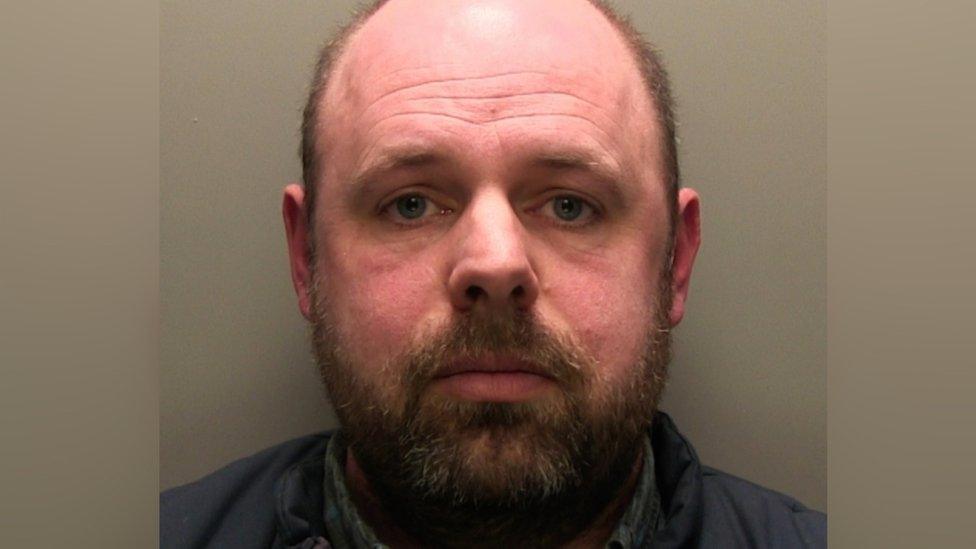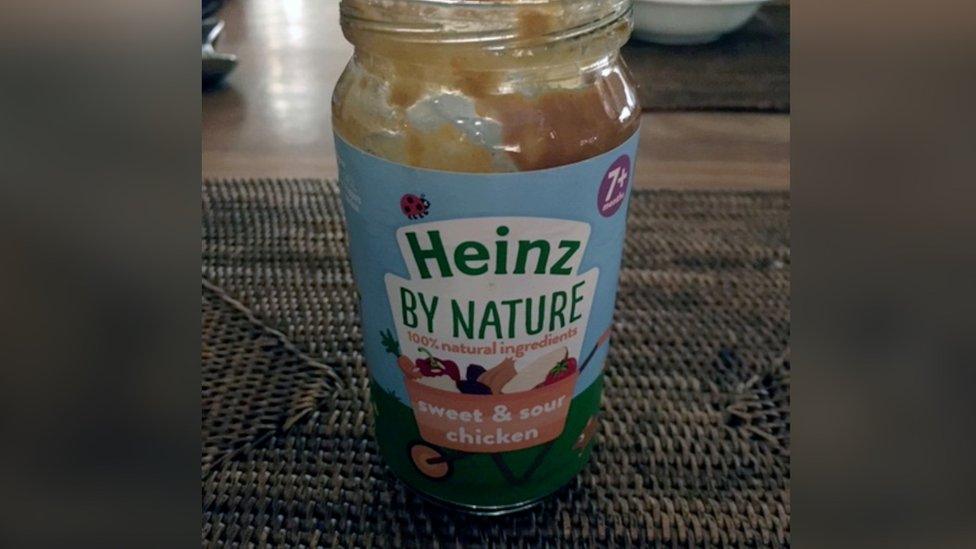Tesco blackmail plot: Nigel Wright contaminated baby food
- Published
Wright was caught on CCTV placing contaminated baby food on to a shelf in a Tesco supermarket
A farmer has been found guilty of adding metal shards to baby food in a plot to blackmail Tesco.
Nigel Wright, from Market Rasen in Lincolnshire, tried to extort £1.4m from the supermarket chain.
The Old Bailey heard how two mothers were moments away from feeding their infants when they spotted the shards.
Wright was convicted of three counts of blackmail and two charges of contaminating goods. He will be sentenced on 28 September.
Jurors were told he sent dozens of letters and emails to the supermarket giant between May 2018 and February 2020 and demanded the money was paid via the online currency Bitcoin.
The 45-year-old was convicted of a further charge of blackmail for demanding £150,000 worth of Bitcoin from a driver with whom he had a road rage altercation.

Nigel Wright will be sentenced at the Old Bailey on 28 September
Mr Justice Warby asked for a psychiatric report to be prepared ahead of Wright's sentencing hearing saying: "(Wright) has or appears to be mentally disordered."
The judge warned Wright that he faced a lengthy custodial sentence, telling him that punishments for these types of offences range from between eight and 17 years in prison.
Wright was captured on CCTV placing one of the contaminated jars on the shelf of a Tesco supermarket in Lockerbie.
Morven Smith, who is from the Scottish town, told the court she was feeding her baby when she spotted the shard of metal in the bowl. "I gave my son a couple of spoonfuls and noticed something shiny," she said. "It was horrendous. I felt sick I was so shocked."
A second mother, from Rochdale, also reported discovering fragments of metal when she was feeding her nine-month-old daughter.

Fragments of a craft knife were found in this jar of baby food
When police raided his sheep farm they found photographs of contaminated baby food and draft blackmail notes on his laptop.
One note read: "Imagine a baby's mouth cut open and blood pouring out, or the inside of their bellies cut and bleeding. You pay, you save them."
Wright, who signed off as the fictional character "Guy Brush" and "the Dairy Pirates", claimed to be part of a cohort of farmers angry at the low price they were paid for their milk.
The farmer admitted placing a jar of Heinz baby food on a shelf in a store in Lockerbie, but claimed he was forced into it by travellers who threatened to kill him and his family, the court heard.
The discovery of the jar in Scotland prompted Tesco to issue a product recall. In total 42,000 jars of baby food were recovered but there was no evidence that further jars had been tampered with.
Deputy Senior Investigating Officer Lucy Thomson, from Hertfordshire Constabulary, described what Wright did as "absolutely disgraceful"
She added: "I think his crime was absolutely horrific and of the most cynical nature, putting babies at risk, and mothers, feeding their children.
"I don't think it gets much worse."
Ms Thomson said that officers had not uncovered any evidence that supported Wright's claims that he was being threatened by travellers to carry out the plot.
A Tesco spokesperson said: "The safety of our customers has always been our priority.
"Today's conviction is the result of decisive and collaborative actions which we took alongside law enforcement agencies."

The blackmail investigation
The two year hunt for Nigel Wright, named Operation Hancock, became the UK's largest ever blackmail investigation
At one point more than 100 officers were working on the investigation with 30 officers watching CCTV footage around the clock.
Wright was eventually arrested on 25 February following an investigation led by the Bedfordshire, Cambridgeshire and Hertfordshire Major Crime Unit with the help of the National Crime Agency.
Also involved were the Food Standards Agency, Food Standards Scotland, Public Health England, Public Health Scotland and Police Scotland.
During the raid on his farm police recovered some £100,000 in Bitcoin which had been sent by undercover officers during the investigation.
Assistant Chief Constable Bill Jephson, who led the investigation on behalf of Hertfordshire Constabulary, described it as the "most serious and most challenging" product contamination case ever dealt with in the UK.

Follow BBC East Yorkshire and Lincolnshire on Facebook, external, Twitter, external, and Instagram, external. Send your story ideas to yorkslincs.news@bbc.co.uk, external.
- Published14 August 2020

- Published12 August 2020

- Published11 August 2020
